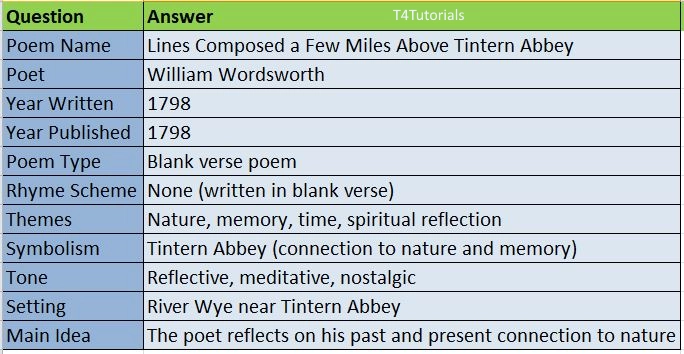Summary:
William Wordsworth’s “Tintern Abbey” is a reflective poem that explores the poet’s deep connection with nature over time. After five years, he returns to the banks of the River Wye, near Tintern Abbey, and contemplates how his perception of nature has evolved. As a young man, he experienced nature with pure excitement and physical joy. Now, with maturity, his appreciation has deepened into a spiritual and philosophical connection. He realizes that nature has shaped his thoughts, emotions, and moral understanding. Even when far away, the memory of these landscapes brings him peace, inspiration, and comfort. Wordsworth also speaks to his sister, Dorothy, hoping that she will continue to find joy and wisdom in nature. He believes that nature is a teacher and guide, offering both immediate happiness and long-term spiritual fulfillment. The poem explores themes of memory, time, change, and the transcendence of nature, emphasizing how human experiences evolve but nature remains a constant source of solace.
10
Score: 0
Attempted: 0/10
Subscribe
| Question | Answer |
| Poem Name | Lines Composed a Few Miles Above Tintern Abbey |
| Poet | William Wordsworth |
| Year Written | 1798 |
| Year Published | 1798 |
| Poem Type | Blank verse poem |
| Rhyme Scheme | None (written in blank verse) |
| Themes | Nature, memory, time, spiritual reflection |
| Symbolism | Tintern Abbey (connection to nature and memory) |
| Tone | Reflective, meditative, nostalgic |
| Setting | River Wye near Tintern Abbey |
| Main Idea | The poet reflects on his past and present connection to nature |